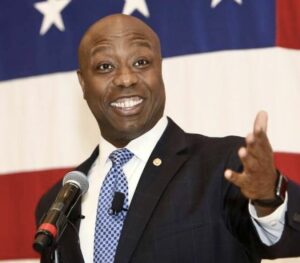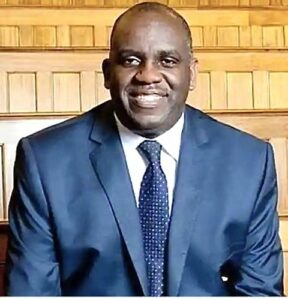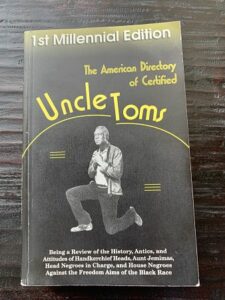The subject of entrenched racism and its poisonous persistence sparked a bunch of BS from T.S. on both sides of the Atlantic Ocean recently.
This BS [bullshit] is vehement declarations that institutional racism no longer exists in either America or England.
This BS asserts institutional racism miraculously disappeared in recent months from those two nations, each with lengthy, documented histories of pervasive racial prejudice against non-whites.
Evidence of institutional racism in America and England is easily observable from abusive policing to exclusionary employment to vast disparities in wealth between whites and non-whites.
Two prominent purveyors of this nonsensical notion of no institutional racism in America and England share a few things in common, beyond their readiness to deny the realities of racism experienced daily by non-whites in those nations separated by The Pond.
Both of these purveyors are Black.
Both are politically conservative.
And both of these purveyors have names with the same T.S. initials: Tim Scott in America and Tony Sewell in England.

Scott is a U.S. Senator from South Carolina – the state where America’s Civil War began when southern states sought to maintain slavery.
South Carolina is a southern state where the poverty rate for Blacks is 23.1 percent compared to a 9.3 percent for whites. South Carolina also is a state where the prison population is 59 percent Black despite Blacks comprising just 27 percent of South Carolina’s overall population.
Despite racial disparities in rates of poverty and imprisonment being among widely recognized indicators of institutional racism, Scott contends racism is no longer a problem anywhere in the United States.
“Hear me clearly, America is not a racist country,” Scott proclaimed during his recent delivery of the Republican Party’s rebuttal to U.S. President Joe Biden’s first address to Congress.
Dr. Tony Sewell is chair of England’s Commission on Race and Ethnic Disparities, the body setup last year by conservative Prime Minister Boris Johnson after Black Lives Matters rocked the England following the police murder of George Floyd in America.
“Put simply we no longer see a Britain where the system is deliberately rigged against ethnic minorities,” Sewell stated in the Foreword of the Commission’s controversial report issued weeks before Tim Scott’s assertion about ‘no racism in America.’

Sewell, often scored for his repeated dismissal of the realities of institutional racism, acknowledged that disparities exist. However, Sewell stated in his Foreword that very few of those impediments that impact non-whites at disproportional rates directly involved “racism.”
Conclusions in that Disparities report about minimal institutional racism clash with evidence indicative of structural discrimination across English society. For example, the unemployment rate for non-whites in England is triple the rate for whites and Blacks comprise just 155 of that nation’s 23,000 college professors.
Sewell argues factors like lack of family values and often lackadaisical pursuit of available opportunities impact life chances more “than the existence of racism.”
Release of the Commission’s report ignited intense outrage across England from petition campaigns to protests. Outrage particularly targeted passages in the report like slavery “culturally” benefited Africans.
Criticism of the Commission’s report include a rebuke from the United Nations. According to the UN’s Working Group of Experts on People of African Descent, this report cited “dubious evidence to make claims that rationalize white supremacy by using the familiar arguments that have always justified racial hierarchy.”
Law enforcement is an area long seen as rife with institutional racism from employment to enforcement.
A report from a Parliamentary body issued in October 2020 listed no “Black chief officers” on police forces in England. A February 2021 release from the American Civil Liberties Union (ACLU) noted, “The U.S. policing system has been racist since its inception during the slavery era.”
Senator Scott made his astounding denial of racism in America exactly nine days after a jury convicted a former policeman in Minneapolis, Minnesota for killing George Floyd. That officer kept his knee on Floyd’s neck for 9 minutes and 29 seconds.
Floyd’s killer – Derek Chauvin – had a history of abusive misconduct that escaped police discipline. Experts repeatedly cite the lack of discipline for abusive policing as evidence of the institutional racism that shields white police from accountability when abusing Blacks.
Ten days before Chauvin’s conviction, police in a Minneapolis suburb fatally shot Daunte Wright during a traffic stop. The day after Chauvin’s conviction police in Elizabeth City, NC fatally shot Andrew Brown Jr. during an arrest. Both Wright and Brown were Black. Both were unarmed. Police involved in each of those fatal shootings were white.
Critics cite the Stop-&-Search police practice in England as a prime example of institutional racism due to its focus on non-whites.
A February 2021 British government report stated police subject Blacks to Stop-&-Search vastly more than whites. There were “6 stops and searches for every 1,000 White people, compared with 54 for every 1,000 Black people,” that report stated.
Dr. Sewell’s Disparities Commission report, however, defended Stop-&-Search as a “critical tool for policing” that just needed better public awareness of its “legitimacy.”
Racial profiling like Stop-&-Search plus other abusive policing triggered disturbances in England during the past 50-years. The August 2011 rioting that spread from London into other major cities across England erupted after a fatal shooting by police in the North London community of Tottenham. A judicial ruling in 1971 found institutional racism within the police force of London, the city where nearly half of England’s current Stop-&-Search take place.
Abusive policing sparked two riots in London’s Brixton community in the early 1980’s. Dr. Sewell grew up in Brixton. Sewell, was in his twenties at the time of those Brixton riots and one in Tottenham also sparked by abusive policing.
Senator Tim Scott’s declaration and Dr. Tony Sewell’s report resulted in strident criticisms directed at each man. Both bristled at detractors who again labeled each an ‘Uncle Tom’ for again aiding anti-black agendas.
The tag Uncle Tom, according to definitions contained in “The American Directory of Certified Uncle Toms” arguably encompass the actions and attitudes of both Scott and Sewell.

Definitions in that Directory include, “Blacks who obscure or deny the reality of racial oppression…Toms maintain, rather than challenge, the racial order…”
That Directory, published in 2002, contains no listing for either Scott or Sewell.
In the U.S. Senate, Tim Scott voted 90 percent of the time to support President Donald Trump, widely seen by African Americans as one of the most racist presidents in U.S. history. Tony Sewell said he eagerly accepted the invitation to chair the Disparities Commission extended by Prime Minister Boris Johnson, the recipient of wide condemnation from Black Brits for his racist practices as Mayor of London and later Prime Minister.
